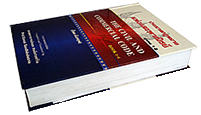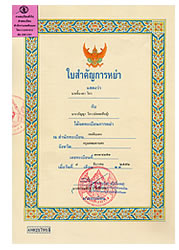Thai family law
laws in Thailand for foreigners
Family law covers areas like marriage, divorce, property of husband and wife, adoption, parentage, succession. The core collection of family laws in Thailand can be found in Book 5 of the Thailand civil code. Book 5 of the civil code is intended to systematically and comprehensively deal with all areas of Family Law in Thailand. Book 6 of the civil code deals with succession and inheritance.
 Family law in Thailand is codified and not made by judges, but courts and independent judges do have some freedom in the interpretation of words and sections of the civil code, unless the supreme court of Thailand (the highest court) has given specific rules for the interpretation or determined the exact (legal) meaning of words and sections applied. Supreme court judgement have binding authority and explain the meaning of certain elements, sections or words of written laws.
Family law in Thailand is codified and not made by judges, but courts and independent judges do have some freedom in the interpretation of words and sections of the civil code, unless the supreme court of Thailand (the highest court) has given specific rules for the interpretation or determined the exact (legal) meaning of words and sections applied. Supreme court judgement have binding authority and explain the meaning of certain elements, sections or words of written laws.
This means that under Thai law marriage is in the first place governed by the civil code and to understand the legal responsibilities of husband and wife and financial consequences of being formally married in Thailand one should read the relevant sections in the civil code, but note that certain principles and sections of the civil code could be further specified or explained by the supreme court of Thailand. For example prenuptial agreements are recognized and enforceable under Thai law (book 5, title 1, chapter 4 'property of husband and wife'), however the law (section 1465) also stipulates that the content of a prenuptial cannot contain clauses contrary public order or good morals. What 'contrary public order and good morals' exactly means is not specified in the civil code and independent judges can set aside certain clauses in the prenuptial agreement and consider them void pursuant section 1465 second paragraph (as against good morals or public order), but, if any, they must take into account previous supreme court opinions and judgments on the second paragraph of section 1465 civil code.
Below the content of the Thai civil code governing marriage and family laws which is the primary source of Thai family law.
FAMILY LAW (CIVIL LAW BOOK V TABLE OF CONTENTS)
-
Title I, Marriage
- Part I Betrothal Sections 1435 - 1447
- Part II Conditions of Marriage Sections 1448 - 1460
- Part III Relationship of Husband and Wife Sections 1461 - 1464
- Part IV Property of Husband and Wife Sections 1465 - 1493 (personal and marital assets)
- Part V Void of Marriage Sections 1494 - 1500 (annulment)
- Part VI Termination of Marriage Sections 1501 - 1535 (divorce and death)
INHERITANCE LAW (CIVIL LAW BOOK VI TABLE OF CONTENTS)
-
Book VI Succession and Inheritance law
- Title I Devolution of an Estate Sections 1599 -1603
- Title II Heirship in Thailand Sections 1604 - 1607
- Title III Disinheritance Section 1608 -1609
- Title IV Renuncation of an Estate and Miscellaneous Provisions Sections 1610 - 1619
- Statutory Right of Inheritance Sections 1620 - 1628
- Division into Portions Between Several Classes and Degrees of Statutory Heirs Sections 1629 - 1631
- Division into Shares Between the Statutory Heirs in Each Class and Degree Sections 1632 - 1634
- Spouses Sections 1635 - 1638
- Representation for the Purpose of Reveiving Inheritance Sections 1639 - 1645
- Wills Sections 1646 - 1654 (last will or testament)
- Forms of Wills Sections 1655 - 1672
- Effects and Interpretation of Wills Sections 1673 - 1685
- Wills with the appointment of Controller of Property Sections 1686 - 1692
- Revocation and Lapse of a Will or Clause in a Will Sections 1693 - 1699
- Nullity of a Will or of Clause in a Will Sections 1700 - 1710
- Administration of an Estate Sections 1711 -1733
- Realization of Assets, Payment of Debts and Distribution of an Estate Sections 1734 - 1744
- Partition of an Estate Sections 1745 - 1752
- Vacant Estates Sections 1753 - 1753
- Prescription Sections 1754 - 1755
Thai marriage registration in Thailand
Foreigners who want to formalize their relationship with a Thai national can enter into a civil marriage which is effected upon registration of the marriage being made in the Thai government's marriage registers. Before the marriage in Thailand can take place the foreigner must obtain certain documents (e.g. affirmation of marital status or 'affidavit of freedom to get married') from his/ her consulate or embassy in Thailand and have these translated to Thai by a licensed translator and then legalized by the legalization division at the Ministry of Foreign Affairs of Thailand. An officially registered marriage with the Thai authorities will be recognized as a valid marriage in most other countries. Most foreign embassies in Thailand offer practical information about marriage and the marriage procedure in Thailand and issue official documents required for registration of the marriage. Visit your embassy's website:
- Deutsche Botschaft
- British Embassy
- US Embassy
- Nederlandse Ambassade
- Sveriges Ambassa Bangkok
- More embassies
Divorce in Thailand
If a married couple wants to divorce and formally terminate their marriage in Thailand this could be done in person by both spouses jointly based on mutual consent through simple divorce procedure at the local municipality (uncontested divorce), or, in case to couple cannot agree on the terms of the marital dissolution this can be done through a more complicated court procedure based on the grounds given in the civil code which requires the involvement of a lawyer to represent you in a court. The primary source of Thai divorce law is the civil code book 5, title 1, part 6 'termination of marriage'.
Visa and Immigration matters in Thailand
In most cases foreigners do not need assistance to obtain a visa and/ or followed by a 'permission to stay' in Thailand (e.g. marriage visa, retirement visa). An entry visa (tourist, non-immigrant visa) must be obtained from a consulate or embassy outside Thailand, then, after arrival in Thailand, and if the foreigner meets the requirements, permission for a long term stay can be applied inside Thailand at the local immigration office (apply outside, upgrade your visa stay inside Thailand). Websites of Thai embassies or consulates or the Thai Ministry of Foreign Affairs offers a source of information for visa matters. For more information visit:
Other related:
- The Thai Immigration Bureau (click on the English section)
- Ministry of Foreign Affairs (English section)
- Thai visa forum (English language expat forum)
Family law related
- Marriage in Thailand
- Divorce in Thailand
- Inheritance in Thailand
- Power of Attorney
- Land ownership by a Thai national married to a foreigner
